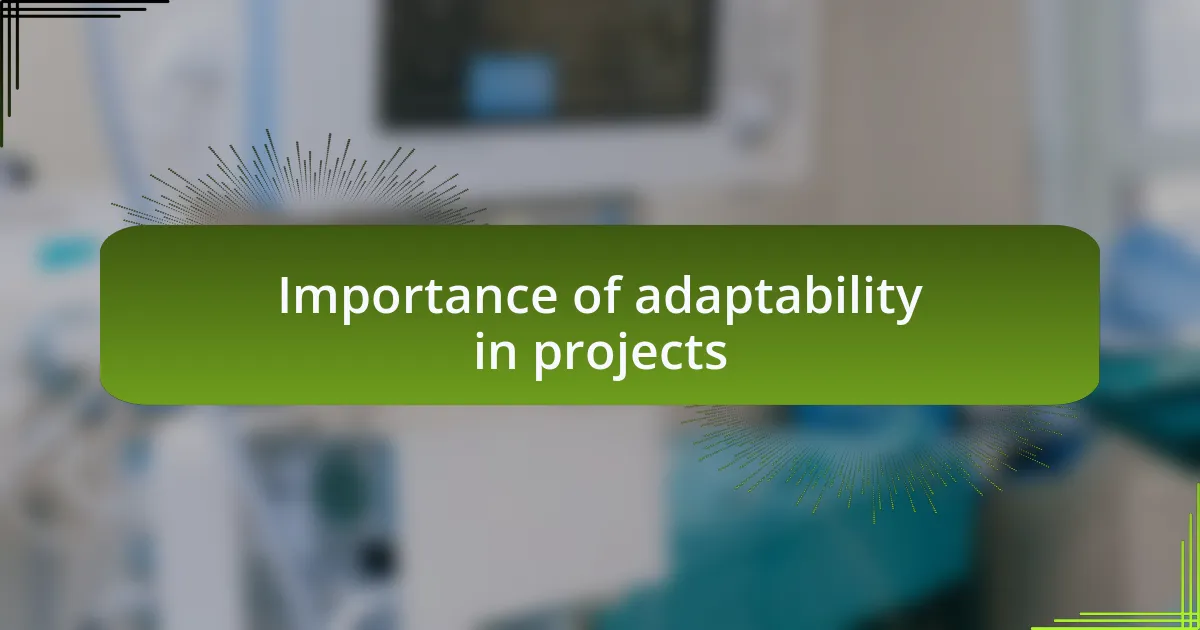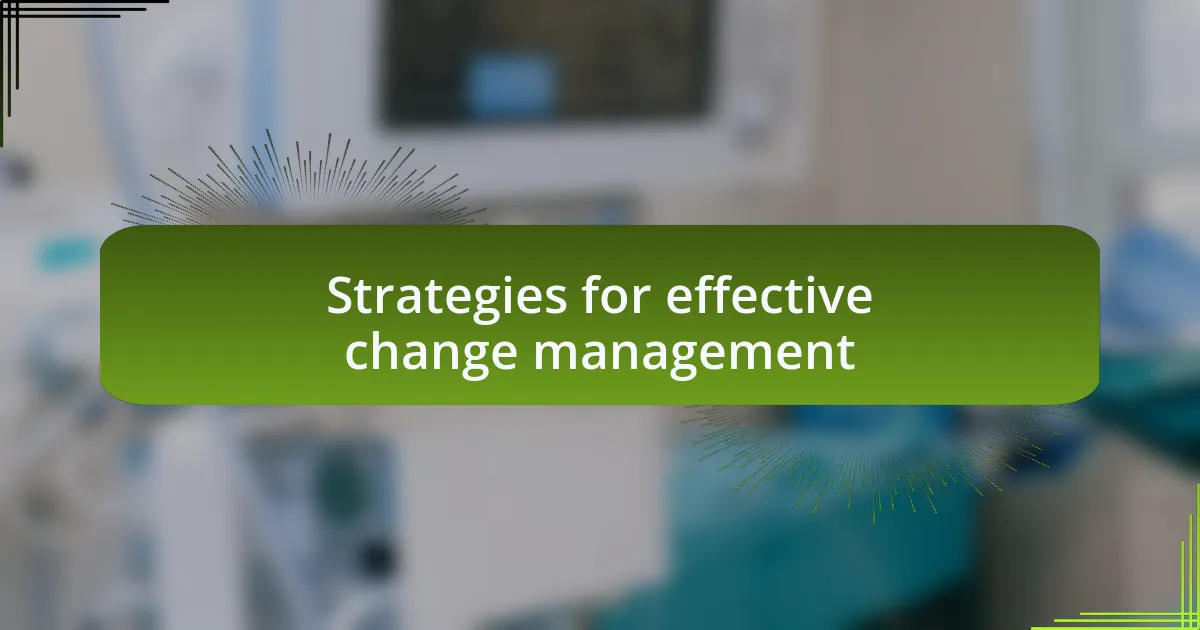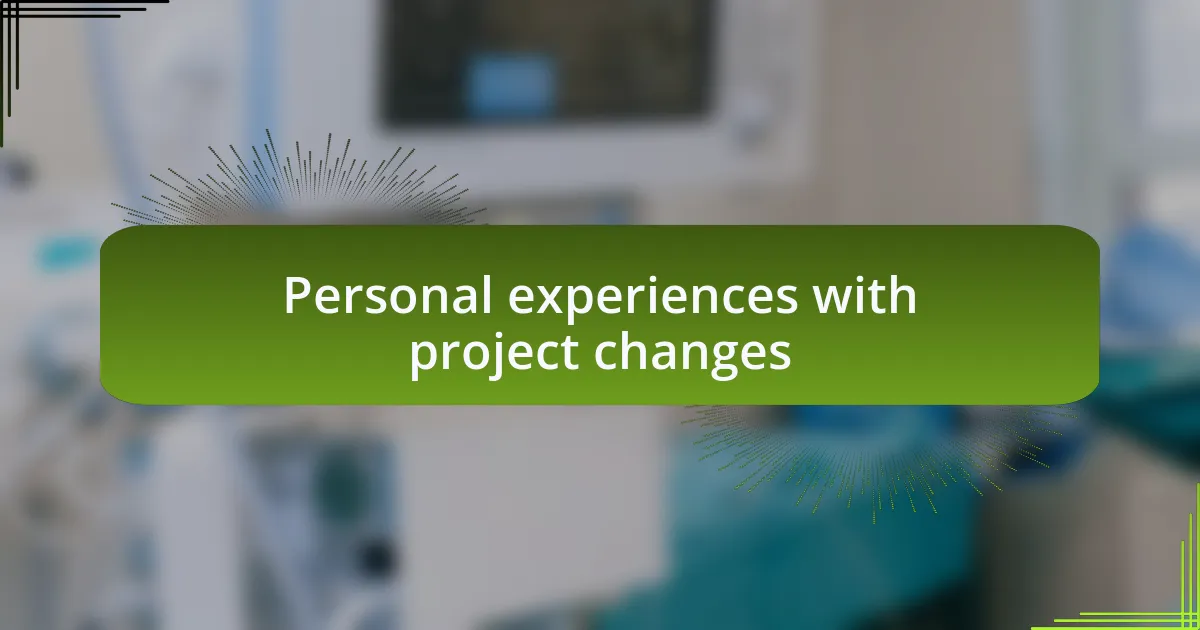Key takeaways:
- Adaptability and effective communication are crucial for navigating project changes in engineering, fostering collaboration and innovation during unforeseen challenges.
- Involving team members in the change process and celebrating small wins boosts morale and commitment, leading to more effective outcomes.
- Utilizing project management, version control, and communication tools enhances accountability and simplifies the tracking of changes, reducing miscommunication.
- Continuous learning and reflection after projects can improve future adaptability and strengthen problem-solving capabilities within teams.

Understanding project changes in engineering
In engineering, project changes are not just common; they’re almost inevitable. I remember a project where we were halfway through the design phase when a critical component’s specifications changed. It left me thinking: how do we stay agile when the ground shifts beneath us?
Understanding these changes requires a keen awareness of the project’s scope and objectives. I once found myself in a situation where understanding these parameters helped guide my decisions, maintaining team morale and alignment despite the upheaval. Have you ever felt that tension when plans change? It’s crucial to address those feelings to foster a resilient response.
Effective communication is the bedrock of adapting to alterations in an engineering project. During a particularly challenging revision, I learned how open discussions transformed anxiety into collaboration. This experience made me realize that when team members are encouraged to voice their concerns and suggestions, they often contribute fresh ideas that enhance the project’s outcome. How have you navigated such conversations in your experiences?

Importance of adaptability in projects
The ability to adapt in project management is crucial, particularly in the engineering field where conditions can shift rapidly. I’ve worked on a project that initially seemed straightforward, but midway through, we encountered unforeseen regulatory changes. I remember the initial concern within the team, yet it became a pivotal moment for us to innovate. How often do you see challenges morph into opportunities for growth?
Adaptability also fosters resilience among team members. I led a group during a project where unexpected material shortages forced us to rethink our approach. Instead of succumbing to frustration, we rallied together, prioritizing flexibility and resourcefulness. It was inspiring to watch the team transform setbacks into creative solutions. Have you ever witnessed a group rise to the occasion when faced with adversity?
Furthermore, embracing adaptability cultivates a culture of continuous learning. After navigating yet another unexpected change in one project, I encouraged my team to document our challenges and how we adapted. This practice not only improved our processes but also reinforced the idea that change can be a pathway to improvement. How have you harnessed change as a learning opportunity in your projects?

Strategies for effective change management
One effective strategy I’ve found is to establish clear communication channels before changes arise. I remember a project where, during a significant shift in client expectations, our regular check-ins proved invaluable. We quickly facilitated open discussions about the changes, ensuring everyone was on the same page. Have you ever noticed how a small adjustment in communication can prevent larger misunderstandings down the line?
Another approach that really resonates with me is involving the team in the change process. I recall a time when shifts in project timelines required all hands on deck. By inviting team members to brainstorm solutions rather than dictating changes, I witnessed a surge in ownership and commitment. Wouldn’t you agree that when people feel their voices matter, they’re more likely to contribute meaningfully?
Lastly, recognizing and celebrating small wins during transitions is crucial. In one instance, as my team adapted to a new software tool, I made it a point to highlight every successful task completed with it. This not only boosted morale but reminded everyone that progress, even if incremental, is still progress. How have you celebrated small victories in your projects to keep the momentum going?
![]()
Tools for tracking project changes
When it comes to tracking project changes, I’ve found that utilizing project management tools like Trello or Asana can be a game changer. I distinctly remember a project where we faced a sudden shift in client requirements; having everything documented visually helped the team understand tasks at a glance. Do you see how such tools can simplify complex tasks and make everyone more accountable?
Another invaluable tool I’ve used is version control software, like Git. It’s amazing how this tool allows teams to manage changes in code seamlessly. I once worked on an engineering project where multiple developers contributed simultaneously, and Git prevented confusion over file versions. Isn’t it reassuring to realize that with the right tool, the risk of errors diminishes significantly?
Lastly, integrating communication tools such as Slack can enhance the change tracking process. I vividly recall a time when our team used dedicated channels to discuss ongoing changes, which fostered real-time feedback and swift responses. How often have you experienced delays due to miscommunication? With tools promoting transparency and collaboration, those delays can be drastically reduced.

Personal experiences with project changes
Adapting to project changes can be challenging, but I’ve learned that embracing flexibility is key. There was a project where the scope changed almost overnight, throwing my timeline into disarray. I remember the initial panic, followed by a realization that such shifts could also spark creativity. Have you ever noticed how a sudden change might lead to a much better outcome than you first envisioned?
In one particular instance, our engineering team was tasked with redesigning a product due to new safety regulations. I felt a mix of stress and excitement—on one hand, we had tight deadlines; on the other, this was a chance to innovate. As we embraced the challenge together, we transformed our initial stress into collaborative brainstorming sessions that ultimately led to a winning design. Isn’t it fascinating how teamwork can turn obstacles into opportunities?
Another memorable experience was a project where client feedback necessitated changes roughly halfway through development. I remember feeling frustrated at first, but I quickly adapted and involved myself in collaborative discussions to better understand the client’s perspective. That pivoting moment taught me the importance of active listening—an essential skill when navigating project changes. Have you ever had to shift your mindset quickly to align with a new direction?

Future approaches to project adaptability
Looking ahead, I believe that leveraging technology will play a significant role in enhancing project adaptability. For instance, when my team started using Agile project management tools, we found that sprint reviews allowed for regular adjustments based on evolving requirements. It was eye-opening to see how these brief check-ins could lead to more dynamic development, allowing us to pivot when necessary without causing major disruptions. Have you ever wondered how tech-driven approaches could reshape teamwork?
Moreover, I see a growing emphasis on cultivating a culture of resilience within engineering teams. In my experience, fostering an environment where individuals feel safe to express concerns and suggest changes has led to stronger problem-solving capabilities. I once worked with a group that prioritized open communication, and it was incredible to witness how quickly we adapted to unexpected setbacks. Wouldn’t it be valuable to create a space where everyone feels empowered to contribute to adaptability?
In addition, continuous learning and adaptation are vital. I’ve found that taking the time for reflection after each project can provide insights that enhance future initiatives. For example, I often share lessons learned with my colleagues to prepare us for challenges ahead. How do you integrate lessons from your past projects to improve your future adaptability? It’s this cycle of reflection and growth that I believe is essential for evolving with the unpredictable nature of engineering projects.